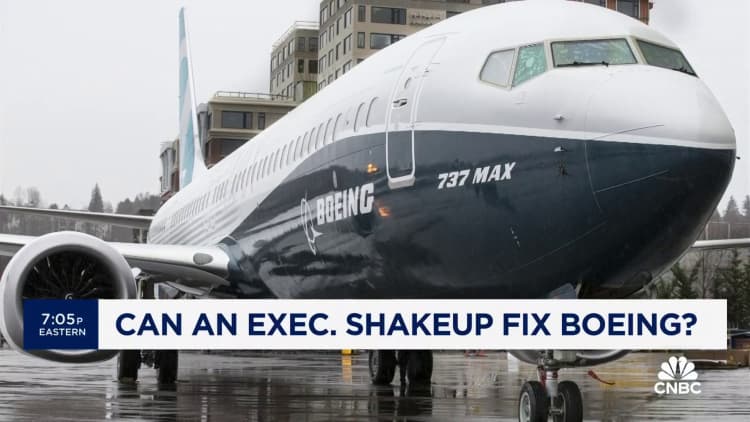
A Boeing 737 Max aircraft on display at the Farnborough International Air Show, in Farnborough, Britain, July 20, 2022.
Peter Tsibora | Reuters
Boeing must be led by engineers if it is to emerge from its current crisis, Tim Clark, president of Emirates Airline, said in comments on Wednesday.
The US aerospace giant is mired in controversy again after a recent series of in-flight technical failures, starting with a door panel that broke off from a new Alaska Airlines 737 Max 9 while in the air on January 5.
The Federal Aviation Administration and the Department of Justice are now taking a closer look at the plane maker, with the former limiting production of Boeing’s 737 jets to 38 a month while it investigates its manufacturing practices. The FAA grounded all 737-9 Max aircraft with door plugs on January 6.
“To fix Boeing’s problems, the company needs strong engineering leadership at the helm combined with a management model that prioritizes safety and quality,” said Clarke, who heads Dubai’s Emirates carrier.
“It is no wonder that the Union of Machinists is asking for a seat on the board, simply to ensure that the voice of the factory floor is an integral part of the decision-making process and is fully integrated into the risk management strategies of the management model.”
Aviation analysts and former Boeing employees have criticized the company’s reported abandonment of engineers in its senior management ranks. They note that of Boeing’s top executives, the only one with an engineering background is Stan Diehl — the outgoing CEO of Boeing’s commercial aircraft division — and he is retiring and will be replaced as part of the company’s sweeping management shakeup announced Monday .
Stephanie Pope, Boeing’s chief operating officer, replaced Deal. Boeing CEO Dave Calhoun will also step down at the end of 2024.
“Whether this changing of the guard will once again solve Boeing’s problems only time will tell, but time, unfortunately, is not on their side,” Clark said. “I would suggest that some serious lateral thinking begins as soon as possible.”
CNBC has reached out to Boeing for comment.

Until the Alaska Airlines incident, the planemaker was thought to have recovered from the 2018-2019 crisis period in which two of its new 737 Max planes crashed within a six-month period, killing 346 people.
The 737 Max was grounded globally for nearly two years afterward, and subsequent investigations found problems with the plane’s design, insufficient pilot training for the new models and the withholding of information from safety regulators, leading to billions of dollars in fines for Boeing and the replacement of senior management.
But after the Alaska Airlines door blew up in January, a six-week FAA audit of Boeing and Spirit AeroSystems “found numerous instances where the companies allegedly failed to comply with manufacturing quality control requirements,” according to an FAA release on March 4.
“The FAA identified issues of non-compliance in Boeing’s manufacturing process controls, parts handling and storage, and product controls,” the statement said. The regulatory agency said it informed Boeing management that it “must consider the audit findings as part of its comprehensive corrective action plan to address systemic quality control issues” and address its “safety culture.”
In a previous statement cited by CNBC, a Boeing spokesperson said in response to the FAA’s findings that the company continues to “implement immediate changes and develop a comprehensive action plan to improve safety and quality.”
“We are fully focused on taking significant, demonstrable action with transparency every step of the way,” the spokesperson said.
— CNBC’s Joan Mouwahed contributed to this report.
